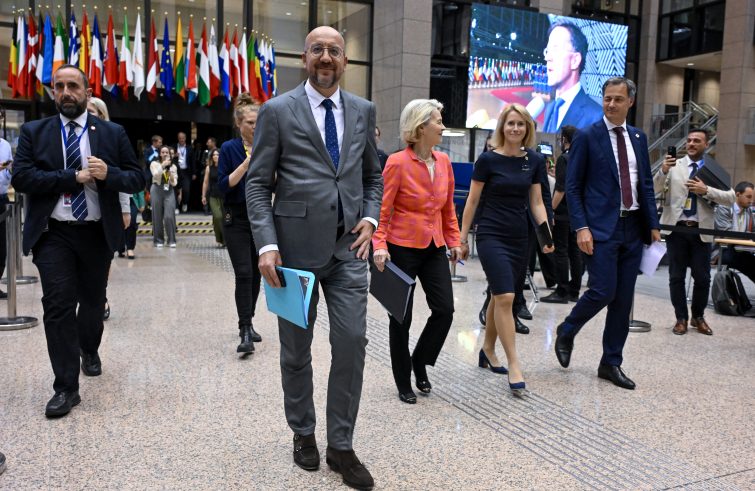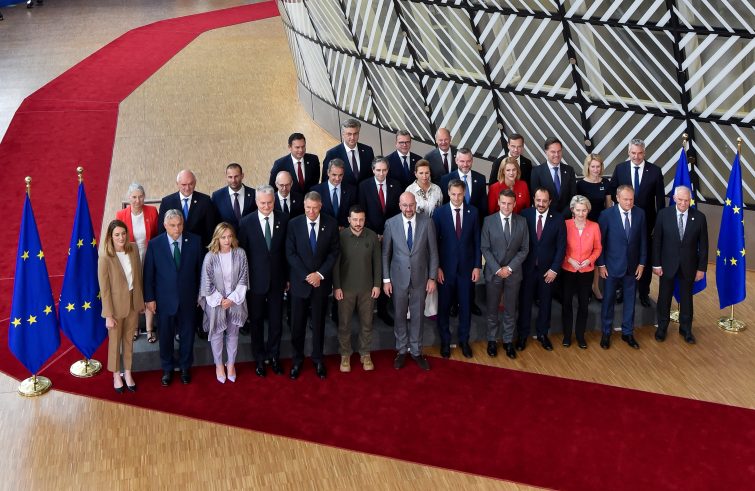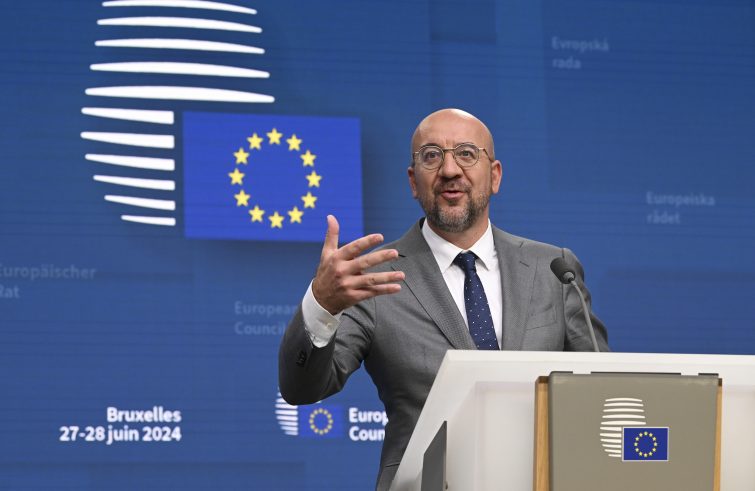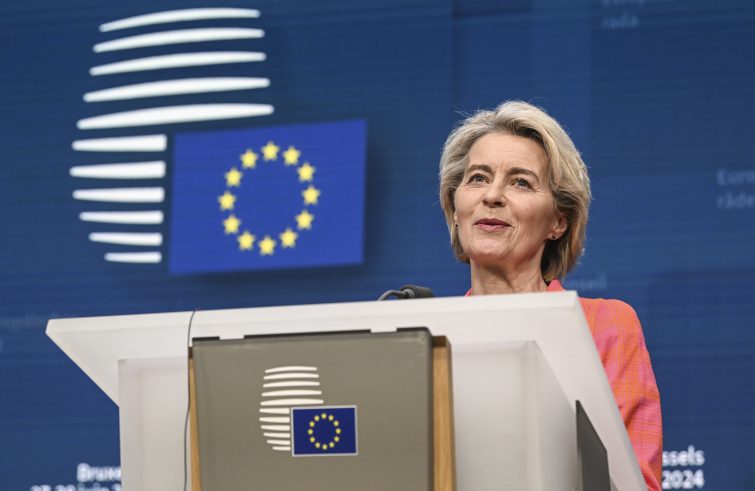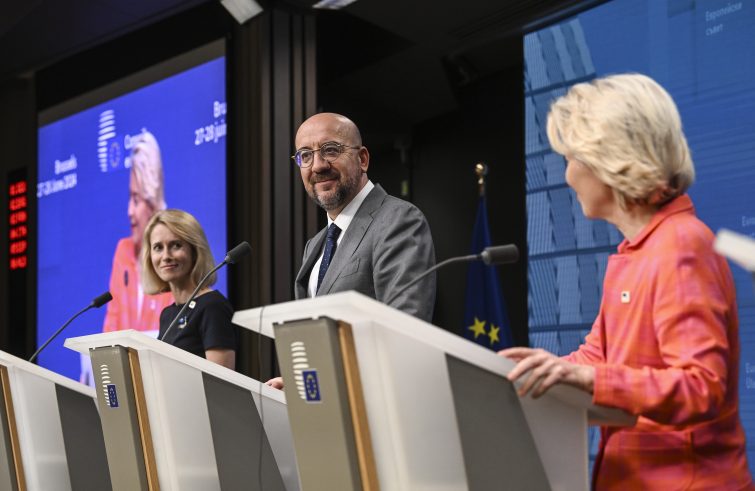
“Mission accomplished”: Charles Michel, president of the European Council, announced late last night the agreement reached by EU leaders on the Union’s top jobs and the strategic agenda for the period 2024-2029. The summit’s “Conclusions” (the 22-page document that sets down in writing the decisions taken in Brussels) refer extensively to support for Ukraine, security and defence, and economic competitiveness. Two lines are devoted to migration and anti-Semitism.
Then the appointments to ‘top jobs’ are announced. “The European Council elected António Costa as President of the European Council for the period from 1 December 2024 to 31 May 2027.” “The European Council adopted the decision proposing Ursula von der Leyen to the European Parliament as candidate for President of the European Commission.” Finally, “the European Council considers Kaja Kallas to be the appropriate candidate for High Representative of the Union for Foreign Affairs and Security Policy, subject to the agreement of the President-elect of the Commission”.
A few formal remarks confirm the agreement between the EPP, the Socialists and the Liberals,
that is, the majority in Europe – as confirmed by the outcome of the 6-9 June elections, albeit also marked by a stronger Eurosceptic minority – excludes the right-wing and the nationalists. An attempt could be made to include the Greens, also because the “Ursula majority” is rather slim and defectors are always lurking, as was the case in 2019 when von der Leyen won the election by only 9 votes.
Hungary’s Viktor Orban voted against von der Leyen, in favour of Costa and abstained on Kallas. Italian Prime Minister Giorgia Meloni abstained on von der Leyen and voted against Costa and Kallas. For Meloni, the choice made by the European Council was “wrong in method and in merit. I decided not to support it out of respect for the citizens and their expectations expressed at the ballot boxes”. In short, Europe is moving forward without Italy (although von der Leyen wants to mend fences with Meloni) and without sovereigntists. Italian Deputy Prime Minister Matteo Salvini went so far as to speak of a “coup d’état in Brussels.”
- (Foto Consiglio europeo)
- (Foto Consiglio europeo)
Moreover, from Germany’s Scholz to France’s Macron, from Poland’s Tusk to Spain’s Sanchez, almost all of the heads of state or government present expressed their full endorsement. Von der Leyen’s second term in office must now be approved by a majority in the European Parliament plenary session. Barring any unforeseen events, this will take place on 18 July. Next, the College of Commissioners will need to be voted through by a majority of MEPs. These non-formal steps will take place by October.
As regards the EU’s necessary reforms, the Conclusions state:
“In order to make the EU stronger and enhance European sovereignty, the European Council underlines the need to lay the necessary internal groundwork and reforms to fulfil the Union’s long-term ambitions and address key questions related to its priorities and policies as well as its capacity to act in the face of a new geopolitical reality and increasingly complex challenges.” This work “should advance in parallel with the enlargement process, as both the Union and future Member States must be ready at the time of accession.” In the coming years, reforms will be discussed and the Commission will be required to establish a roadmap covering the following four key areas: “values, including tools and processes to protect the rule of law;” “policies, to ensure inter alia the EU’s long-term competitiveness, prosperity and leadership on the global stage and to strengthen its strategic sovereignty”; “budget, including in the context of the next negotiations on the Multiannual Financial Framework for which the proposal will be presented by 1 July 2025;” governance, bearing in mind the “progress report on the future of Europe”
- (Foto Consiglio europeo)
- (Foto Consiglio europeo)
The 8-page Strategic Agenda features a comprehensive Foreword, which, inter alia, reads: “The European Union was founded on the imperative of securing peace in Europe, building on cooperation,
solidarity and common economic prosperity. This original promise still guides us and serves as the basis for our priorities for a strong and sovereign Europe.” “The global political landscape is being reshaped by strategic competition, growing global instability, and attempts to undermine the rules-based international order. Russia has brought war back to our continent. In our neighbourhood, the situation in the Middle East is dramatic. Our natural environment is facing increasing damage and disruption due to climate change, biodiversity loss and pollution. The fast development of new technologies brings opportunities and potential risks.” It is then acknowledged that
“These unprecedented challenges have led us to break new ground in our cooperation and integration in the past five years.”
The document specifies: “Together, we have set key goals to fight climate change and put in place an ambitious framework for the digital transition. Together, we developed and distributed vaccines across Europe and beyond and set up a major recovery fund in response to a pandemic that affected our societies in unforeseeable ways. Together, we protected our economies during the energy crisis. And together, we have been providing Ukraine with significant military and economic support to defend itself against Russia’s war of aggression and protect European security. But we will not rest here. We will live up to the call of the Union’s founders and ensure that the creativity of our responses matches the size of the challenges ahead of us.”
Finally, the 2024-2029 Agenda consists of three chapters.
The first: “A free and democratic Europe” (divided into two paragraphs: Upholding European values within the Union; Living up to our values at global level). Second chapter: “A strong and secure Europe” (Ensuring coherent and influential external action; Strengthening our security and defence and protecting our citizens; Preparing for a bigger and stronger Union; Pursuing a comprehensive approach to migration and border management). Third chapter: “A prosperous and competitive Europe” (Bolstering our competitiveness; Making a success of the green and digital transitions; Promoting an innovation- and business-friendly environment; Advancing together). The document concludes with some rather emphatic and bombastic remarks: “Our destiny is in our own hands. We have the talent, courage and vision to successfully shape our future. This Strategic Agenda is our joint pledge to unequivocally serve our citizens and fulfil our founding objective of peace and prosperity.”

